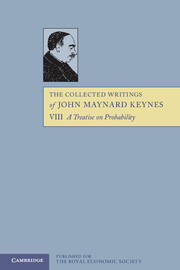Book contents
- Frontmatter
- Contents
- General Introduction
- Editorial Foreword by R. B. Braithwaite
- Editorial Note
- Preface to the First Edition
- I FUNDAMENTAL IDEAS
- II FUNDAMENTAL THEOREMS
- III INDUCTION AND ANALOGY
- 18 INTRODUCTION
- 19 THE NATURE OF ARGUMENT BY ANALOGY
- 20 THE VALUE OF MULTIPLICATION OF INSTANCES, OR PURE INDUCTION
- 21 THE NATURE OF INDUCTIVE ARGUMENT CONTINUED
- 22 THE JUSTIFICATION OF THESE METHODS
- 23 SOME HISTORICAL NOTES ON INDUCTION NOTES ON PART III
- IV SOME PHILOSOPHICAL APPLICATIONS OF PROBABILITY
- V THE FOUNDATIONS OF STATISTICAL INFERENCE
- Bibliography
- Index
21 - THE NATURE OF INDUCTIVE ARGUMENT CONTINUED
from III - INDUCTION AND ANALOGY
Published online by Cambridge University Press: 05 November 2012
- Frontmatter
- Contents
- General Introduction
- Editorial Foreword by R. B. Braithwaite
- Editorial Note
- Preface to the First Edition
- I FUNDAMENTAL IDEAS
- II FUNDAMENTAL THEOREMS
- III INDUCTION AND ANALOGY
- 18 INTRODUCTION
- 19 THE NATURE OF ARGUMENT BY ANALOGY
- 20 THE VALUE OF MULTIPLICATION OF INSTANCES, OR PURE INDUCTION
- 21 THE NATURE OF INDUCTIVE ARGUMENT CONTINUED
- 22 THE JUSTIFICATION OF THESE METHODS
- 23 SOME HISTORICAL NOTES ON INDUCTION NOTES ON PART III
- IV SOME PHILOSOPHICAL APPLICATIONS OF PROBABILITY
- V THE FOUNDATIONS OF STATISTICAL INFERENCE
- Bibliography
- Index
Summary
1. In the enunciation, given in the two preceding chapters, of the principles of analogy and pure induction there has been no reference to experience of causality or law. So far, the argument has been perfectly formal and might relate to a set of propositions of any type. But these methods are most commonly employed in physical arguments where material objects or experiences are the terms of the generalisation. We must consider, therefore, whether there is any good ground, as some logicians seem to have supposed, for restricting them to this kind of inquiry.
I am inclinded to think that, whether reasonably or not, we naturally apply them to all kinds of argument alike, including formal arguments as, for example, about numbers. When we are told that Fermat's formula for a prime, namely, 22α + 1 for all values of α, has been verified in every case in which verification is not excessively laborious-namely, for α = 1,2, 3, and 4, we feel that this is some reason for accepting it, or, at least, that it raises a sufficient presumption to justify a further examination of the formula.
- Type
- Chapter
- Information
- The Collected Writings of John Maynard Keynes , pp. 269 - 278Publisher: Royal Economic SocietyPrint publication year: 1978



